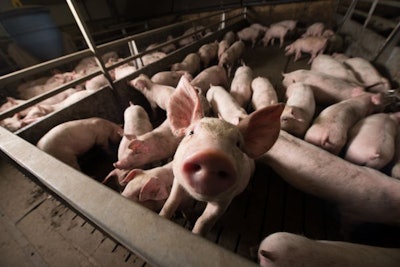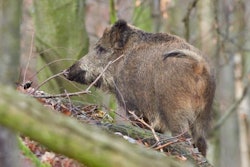
ASF cases in German wild boars on the rise, other EU nations see further spread of the disease
Among the wild boar population in two German states, the number of cases of African swine fever (ASF) continues to rise. And this is just one of the factors blamed for the current state of the country’s pig industry, which is facing multiple challenges.
This week, the economic situation in the German pork industry has been described as precarious by the federal agriculture ministry.
At a meeting with stakeholders in the sector, Minister Julia Klöckner announced her intention to reorganize the whole pork chain in the country. Overarching aim of the latest initiatives — which will include all aspects from concepts to financing — is to ensure the future of competitive pig farming in Germany.
Among the challenges faced by the industry are ASF, which has led to export restrictions to a number of markets. Exacerbating the situation are the ongoing impacts of the coronavirus (COVID-19) pandemic on both formal and informal hospitality, as well as other events. Furthermore, poor weather reduced the number of barbecues that provide popular entertainment for Germans during the summer months.
Earlier this month, a senior official in the federal agriculture ministry warned that Germany — and Europe more widely — were facing a long battle to control ASF.
Meanwhile, in Poland, the number of confirmed outbreaks in domestic pigs so far this year now exceeds 100. Further cases have also been reported in Hungary, Romania, and Russia.
ASF cases in German wild boar approach 2,100
Total confirmed outbreaks in the wild boar population have reached 2,096 based on data from the authorities in the two affected states in the east of the country. This total comprises 1,640 outbreaks in Brandenburg (as of September 10), and 456 in neighboring Saxony (as of September 13).
Since ASF was first detected in Germany just over 12 months ago, the virus has been detected in wild boar in eight districts in these two states — seven in Brandenburg, and one in Saxony.
Among Germany’s domestic pig population, there have been just three confirmed outbreaks so far. All were in Brandenburg during July.
Poland’s outbreak total for 2021 passes 100
A further 20 ASF outbreaks in domestic pigs have been confirmed by the Polish chief veterinary office. Reported in the period September 6-14, these involved a total of 2,060 animals. Majority of the outbreaks were in herds of up to 80 pigs, but four were in herds of between 185 and 529 animals.
Continuing a recent pattern, 14 of the latest outbreaks were in the same county (Mielec) in Subcarpathia (Podkarpackie). In addition, there were three outbreaks each in Lower Silesia (Dolnoslaskie) and Warmia-Masuria.
Based on information from this source, the latest cases bring to 39,000 the number of domestic pigs directly impacted by ASF outbreaks in Poland so far this year at 101 premises.
Two large pig herds in Russia test positive for ASF
In the past week, the Russian veterinary authority has registered two significant ASF outbreaks in domestic pigs with the World Organization for Animal Health (OIE).
Affected in Bryansk oblast were more than 49,000 animals in what is described as a backyard herd. At the end of August, five of the animals are reported to have died at the premises.
In the first week of September, ASF was detected in more than 53,000 pigs at a farm in Pskov oblast. More than 130 of the animals there died.
Located in the Northwestern federal district, the Pskov outbreak appears to be within 20 kilometers of the border with Latvia.
A further outbreak was registered in Vladimir oblast, where there were four mortalities out of a backyard herd of 95 animals in the first week of this month.
Vladimir and Bryansk oblasts belong to the Central federal district of Russia.
Further cases in Romanian swine
Latest official reports from the Romanian animal health agency confirm a further 12 outbreaks of ASF among the country’s domestic pigs. According to the new OIE notifications, these involved a total of 2,024 pigs in counties across the south, east and center of the country.
One of the affected premises was a farm in southern Romania with almost 1,700 pigs. Nine of the animals died, and the rest were being culled at the time of the official report.
In the east of the country, ASF was detected in two carcasses that were found dumped in a public place.
Overview of ASF situation in European pig herds
So far this year, 1,372 outbreaks have been confirmed among domestic pigs, according to the latest update of the Animal Disease Information Notification System from the European Commission (EC; as of September 11). Compared to the start of this month, this is an increase of 198 outbreaks. Of these, 181 were among Romanian herds.
Ten European states have registered ASF outbreaks in pigs so far in 2021. Romania now accounts for 1,213 outbreaks or 88% of the regional total.
As well as Poland and Romania, two other states have registered new outbreaks with the EC so far this month — Ukraine (now with nine outbreaks to date in 2021), and Slovakia (8).
During the whole of 2020, 1,240 ASF outbreaks in pigs were registered with the EC by 10 European countries. Of this total, 1,053 outbreaks were in Romania. The EC system does not monitor the disease situation in Russia.
European wild boar outbreaks pass 9,000
As of September 11, 12 European countries had registered 9,121 ASF outbreaks in wild boar with the EC system in 2021. Registering the most cases so far in 2021 is Hungary with 2,505 outbreaks, followed by Poland with 2,196.
So far this month, nine of these states have recorded with the EC new outbreaks in their respective wild boar populations. These latest cases bring the national totals for the year so far in Germany (to 1,511), Slovakia (1,406), Romania (864), Latvia (204), Bulgaria (198), Lithuania (113), and Estonia (46).
Latest report from Poland’s veterinary office puts the number of outbreaks in which wild boar tested positive for the ASF virus so far this year at 2,074. The 12 latest outbreaks involved animals suspected of the infection found or shot between August 20 and September 2.
ASF threat felt in North America
In April, the ASF virus was detected for the first time in 40 years in the Caribbean island state of the Dominican Republic.
According to official reports to the OIE, 45 outbreaks had been confirmed across the country up to the end of August, directly impacting more than 6,000 domestic swine. Cases have occurred in 15 provinces and the National District, mainly in the northwest and north of the island, but with herds in the south and east also affected.
Last week, U.S. Agriculture Secretary Tom Vilsack issued a video message to draw attention to the ASF threat, and how to protect U.S. pigs from the deadly disease.
View our continuing coverage of the global African swine fever situation.

















